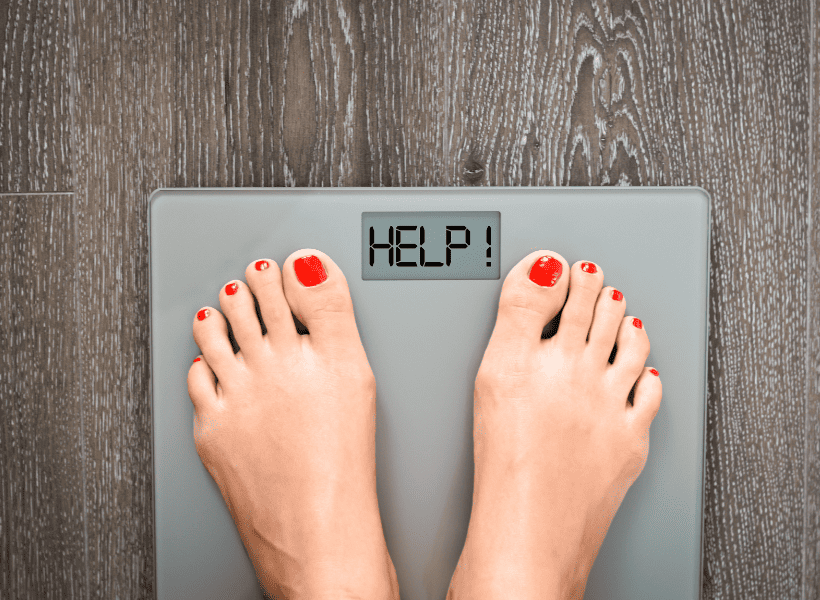If you are a woman over the age of 40, even if you work out all the time, you have probably started to notice a difference in your body. Maybe it’s a difference in how you feel, maybe it’s a difference in the composition of your body or maybe you even notice your muscle mass changing.
Maybe you have even tried cutting calories and working out more often to combat these changes. Have they worked for you?
The reality is that our bodies are changing. There is a significant hormonal shift that happens within our bodies (often times during our 40s, but some people begin to notice them earlier or later), these changes are likely due to perimenopause.
Despite the changes that age and nature create, we can offset these changes and benefit our overall health by making nutritional changes in our lives. If you are ready to make changes in your overall health, you may find that keto for women over 40 is the change that your body needs.
What is the Ketogenic Diet, Anyway?
Are you new to keto? If you are wondering what the heck the ketogenic diet is, here you go!
The ketogenic diet is a low carb diet that focuses on foods that have low carbohydrates and high protein and healthy fats . The keto diet is centered around the idea that the majority of your calories will come from protein and healthy fats as opposed to carbs.
Following a ketogenic diet means that you can expect to cut back on breads, pastas, pastries, sugary drinks and treats.
What is Perimenopause?
Okay, back to the beginning. Let’s talk about perimenopause and what it is. Perimenopause quite literally means “around menopause.” Perimenopause refers to your body making the transition from reproductive years to menopause.
While most women do tend to experience perimenopause in their 40s, it can happen at other times in their lives. Some women can begin to notice these changes as early as mid 30s, while some do not experience these changes until their mid 50s.
Throughout perimenopause the body experiences relatively severe hormonal imbalances, as the levels of estrogens throughout the body rises and falls unevenly. While dealing with perimenopause, you can expect to experience menstrual cycles of differing durations and unlike your typical cycle.
You can also expect symptoms such as issues with sleep, hot flashes as well as more personal issues such as vaginal dryness.
Many women suffer other symptoms during their perimenopause battle. These symptoms can range from weight gain, brain fog, they can become easily overwhelmed and/or fatigued and more.
Perimenopause can last for a variety of lengths of time, depending on the person. Some women experience it for as little as 4 or 5 years and some experience it for as long as 10 years.
At the point where you have missed 12 consecutive months of a menstrual cycle, you have officially reached menopause.
Can Perimenopause Be Helped With Nutritional Changes?
We can confidently say that there is not enough research done on perimenopausal women. There is plenty of research done on women before and after the fact, but those women in the middle of perimenopause are often underrepresented.
That being said, the right nutritional changes can help anyone, no matter the stage of life they are in.
21 Day Keto Challenge + Meal Plan
This challenge pack is everything you need to lose weight fast on keto. Whether you are a short-term keto or lifestyle keto, this is a great meal plan pack!
What are the Benefits of the Keto Diet for Middle-Aged Women
While there is no typical woman (we are all different, of course), choosing the right nutritional plan is the same for all of us. None of us know how our bodies will react to a different style of eating, so it’s essentially trial and error for each and every one of us.
While we have no clinical evidence to prove that keto will help deal with perimenopause, there certainly are reasons to give it a shot and see if it helps your symptoms. Wondering what these reasons are? Find out here:
Potential Weight Loss
Many women in this age group complain of sudden weight gain that seemingly comes out of nowhere. It’s hard to get used to a body that no longer feels like your own, especially when you have been maintaining your body composition fine before.
The reason this happens is due to the estrogen levels changing in our bodies. When your estrogen levels shift, your fat storage patterns do the same. That means that if you are used to storing fat in your butt, boobs and hips (as many women do), you’ll now be facing the fact that you might now be dealing with body fat stores in different areas that you aren’t used to.
For instance, you may now be storing fat in the abdomen or midsection. This is a surprising turn for many of us due to the fact that we are eating fewer calories overall.
It’s important to note that research has shown that weight gain during these years can be caused by menopause itself. Weight gain or the inability to lose weight during perimenopause is one of the main complaints that is heard, which is why keto might just be the best way to battle this issue.
Between clinical studies and anecdotal evidence, it has been shown that switching to a ketogenic or low-carb diet can benefit you in many ways. Here are some of the results that have been discovered in women over 40 who have switched to keto.
- A study showing women ages 49-81 who followed a low carb diet for 8 years found that they were least likely to gain weight, over women who followed other diets.
- A study of women over 50 showed that women who followed a lower carb diet lost slightly more weight than women who followed other traditional diets.
- Studies have shown that keto helps to maintain muscle mass even during the weight loss phase. Since women over the age of 40 tend to lose muscle mass, keto could help to prevent this.

Hunger and Cravings Management
One of the best things about the keto diet is that it is great for reducing hunger and cravings. Excessive hunger and cravings are both issues when it comes to weight gain and inability to lose weight.
A keto diet plan can help you to avoid eating too much sugar or other non keto-friendly foods.
Additionally, due to the decreased estrogen, women over the age of 40 also experience a shift in the hormones that typically regulate hunger. Eating a keto diet can help offset the issues that come with the shift in hormones.
Increased Insulin Sensitivity
Once women hit the age of 40, they tend to have a more difficult time with insulin resistance. This is, again, due to the declining estrogen and progesterone.
Insulin resistance contributes to weight gain, increased fat storage and the shift in fat storage patterns. Insulin resistance also puts women at a higher risk of other potential health risks.
Because keto diets are low glycemic and produce lower insulin, lowering your carb intake can be an effective way to combat these issues.
While it can’t be proven, there have been more recent studies which have shown that glucose intolerance and insulin resistance may be partially to blame for the hot flashes that women often have to deal with during this stage in their lives.
Some women have found that when switching to keto, they have fewer hot flashes to deal with.
Ketogenic Diets are Very Nutrient Dense
As we age, our bodies are not as efficient at absorbing nutrients. This is why making lifestyle changes that include a healthy diet is so important.
The keto diet is great for this because it is so nutrient dense. When you eat unhealthy foods, you are doing yourself a disservice.
Eating healthy, nutrient packed foods means that your body is getting the benefits of said food to a better degree than it otherwise would.
At this age, women’s bodies are more at risk of developing deficiencies in vitamins such as B vitamins (B6 and B12 specifically), vitamin D, Vitamin E and Calcium.
While these deficiencies become more severe as we age, it’s important to start eating healthy now to avoid this issue.
Of course, the healthier your keto diet, the more nutrients you will consume. You can’t expect to eat only cheese and bacon and have a surplus of needed vitamins.
You need to be sure and consume plenty of veggies and other healthy foods too!
Should Women Do Intermittent Fasting and Keto Together?
One question that gets asked often is should keto and intermittent fasting be done together. While combining keto and intermittent fasting is not a requirement, there is also no reason to not combine them.
One reason why the two work well together is that many people unintentionally fast while on keto since they stay full longer, so many have found it easy to combine the two. .
Intermittent fasting has a list of potential benefits, including improvement of insulin sensitivity, weight loss, reduction of visceral fat, better focus, and more.
As women age, our bodies do tend to be more responsive to fasting so this may be a good option to help you reach your health goals.
It is worth mentioning though that some people do bring up the concern that premenopausal women should be careful with fasting as the female body (especially at this age) tends to be hypersensitive to signs of possible food scarcity.
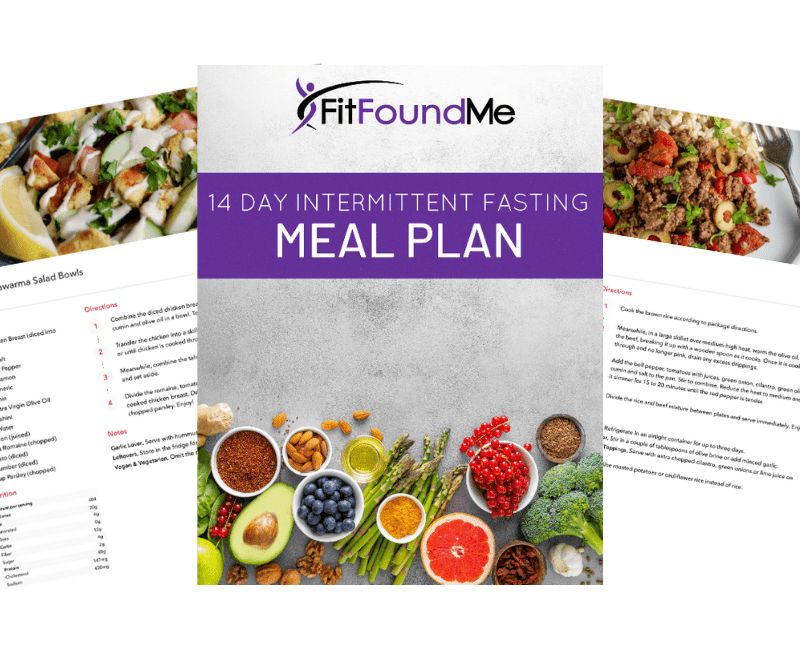
14-Day Intermittent Fasting Meal Plan: 1500 Calories
This is the best meal plan for intermittent fasting! Everything is planned for you – macros, calories, meals, shopping lists…all you have to do is grab the groceries. Don’t waste any more time, get this time saver and start losing weight now!
What are the Risks Associated with Keto?
It’s important to note that there are risks associated with keto. If you are concerned about what these risks are, check below to find out.
Keto Flu
When people first begin the keto diet, many complain about feelings of sickness, namely the following symptoms:
- Nausea
- Fatigue
- Headaches
- Intestinal distress
These symptoms are oftentimes referred to as “keto flu.”
While the keto flu is transitional (it occurs during the transition phase of switching from whatever your previous diet is to the keto diet), the keto flu makes many people give up on the diet shortly after beginning.
There are several bits of good news as it relates to keto flu. First of all, if you end up with keto flu, know that it lasts only a few days. Second, there are ways to avoid having keto flu. These include eating the right foods that are full of nutrients and healthy!
Should Keto Be Done Differently for Women Over 40?
While the keto diet is essentially the same across the board, you may have to tweak it a little bit to fit your current stage in life. For example, aging women tend to be more insulin resistant. If you have found that keto isn’t working as you expected, you may want to switch it up.
This means that you may need to lower your carb intake even more than the typical keto diet would call for. For many people on a keto diet, they stick to a 50 grams of carbs per day rule, whereas for women over 40 you may want to try sticking to 30 grams per day.
It’s good to go into this new eating plan with an open mind and being willing to switch it up and change things that aren’t working.
What Other Lifestyle Changes Should Be Made Once a Woman Hits Her 40s?
Okay, here’s the bottom line. A healthy diet can make a significant difference in your health and life, especially in your 40s, but there is more to it than that. Speaking on women’s health, it’s a good idea to take a whole life approach to getting as healthy as possible and living the best life that we can.
It’s not about finding the best diet or the perfect exercise. It’s about incorporating a mix of the best, healthy lifestyle choices for you. Not sure what we mean? Look at this list below to see what areas your life you can improve upon:
Getting Good Sleep
You may be surprised to hear this, but poor sleep is the root cause of many health issues. This is especially true as we age. Getting good sleep can be just as beneficial as a proper diet or exercise. Here are some interesting facts about sleep:
Risks of Not Sleeping Enough
Some of the risks of not sleeping enough include:
- Fatigue
- More at risk of depression
- Weight gain
- Food cravings
- Increased risk of heart disease
- Increased inflammation
- Death (sounds dramatic, but it’s true. Those who chronically don’t sleep enough have shorter life spans.)
Benefits of Getting Good Sleep
Some of the benefits of getting enough sleep include:
- Helps to maintain weight
- Improves memory, concentration, and focus
- Enhanced athletic performance
- Reduced risk of insulin resistance and type 2 diabetes
- Less risk of depression
- Boosts your immune system
It’s also worth noting that there are health risks associated with getting too much sleep too! The sweet spot for sleep is in the 8 hour range, but no less than 7 hours and no more than 9.
Proper Stress Management
Proper stress management can affect your health in good ways. Chronic stress and the inability to properly channel said stress can cause a myriad of health issues including, but not limited to headaches, irritability, fatigue, poor sleep, etc.
All of these symptoms of stress can then lead to even more serious health issues such as heart disease, weight gain, insulin resistance and more.
Increased Water Consumption
Do you drink enough water? I would be willing to bet that you might not. An estimated 75% of Americans are chronically dehydrated? It’s true. Many people just simply do not drink enough water. Water is vital for good health and you need to make sure that you are drinking enough.
If you are wondering why you should include water into your daily health routine, here are just a few of the benefits of drinking more water:
- Water hydrates your skin and keeps you looking young!
- Water helps you to lose or to maintain weight.
- Drinking enough water helps to encourage muscle growth during your workouts.
- Drinking plenty of water improves your cognitive functions. You’ve got to hydrate your brain!
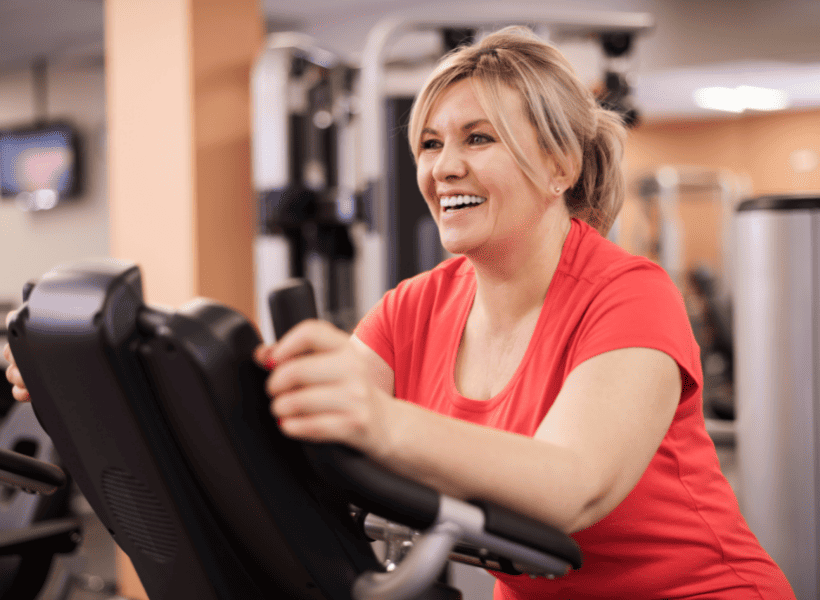
More Exercise
One of the most important things that you can do for your health is exercise. Getting the right amount of exercise is vital to many, many things in life.
While you may think that your energy levels are too low or you have put on too much weight to exercise, that is likely untrue.
Sure, it’s overwhelming to start, but once you do start, you might just find yourself with fewer low energy days, weight loss goals being met and overall just feeling better.
Here are just a few of the benefits that will come with adding exercise into your daily routine:
- Weight loss
- Easier weight management
- Decreased risk of heart disease and stroke
- Decreased risk of diabetes
- Decreased risk of high blood pressure
- Decreased risk of osteoporosis
- Joint and muscle strengthening which means less back pain!
- Better mental health
- Better stress management
- Better mental focus
Of course exercise is important at all stages in life, but as we age it becomes imperative to move our bodies often and purposefully. We want to thrive in our later years, right? We do that by being strong and healthy!
The Bottom Line
We have talked about the keto diet for women over 40, we have talked about the benefits of getting good sleep and enough exercise and even our stress management. Do you know what it really takes to be in our best health in our 40s, though?
All of the above. Yes, it really does take a mixture of all of these different healthy lifestyle choices to lead the best lives we can in our 40s and beyond.
There is no magic weight loss pill, no fountain of youth that will just magically make us young again. It’s our conscious choices and our desire to be our best selves that will help us to lead healthy, active lives as we get older.
For more info on figuring out if Keto is right for you, read our Keto Diet Guide for Women.

21 Day Keto Challenge + Meal Plan
This challenge pack is everything you need to lose weight fast on keto. Whether you are a short-term keto or lifestyle keto, this is a great meal plan pack!

